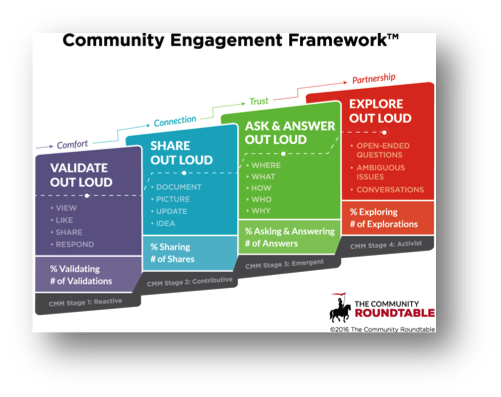By Rachel Happe, Co-Founder, The Community Roundtable
This month, at JiveWorld, I presented Becoming a Community Ninja: 5 Secrets of Community Black Ops. One of those secrets was using  communities to create culture change.
communities to create culture change.
Most organizations do not understand how powerful communities can be in support of goals like creating collaborative and innovative cultures or executing on digital transformation.
I didn’t fully understand this connection, either, until a few years ago when I read The Power of Habit by Charles Duhigg. In it, he itemized three things required for behavior change:
- The mechanics of the change
- The belief that the change is desirable
- A community of the changed
You can establish behavior change with just the first two but, when stressed, people revert to old behaviors, Duhigg noted. However, if they are part of a community of the changed their peers will help them maintain the new behavior. That insight shifted my own thinking about the work we do to advance the practice of community management. I always knew communities could effectively deliver on business outcomes, but this insight helped me to understand that communities are the only effective way to change culture.
But there’s a problem.
First, most of the conversations around culture change and digital transformation are completely separate from the conversations about communities. As I’ve delved deeper into the research on behavior change, I also see another issue with the traditional approaches to culture change. There is very often an emphasis on creating a vision of change and then selling that vision as a driver for behavior change at the individual level.
Changing beliefs in this way is very, very hard – and expensive. It’s also a huge missed opportunity for both those who are investing in culture change and for community program owners, who could better understand and articulate the value communities can deliver to their organizations.
Community managers very rarely tell people to do anything. Instead, they generate behavior change by creating an environment where some behaviors are easy and others are hard through community architecture, UX, behavior modeling, rewarding desired behaviors, triggering incremental new behaviors, moderating out negative behaviors and ensuring positive behaviors are socially reinforced.
When you take a community management approach to behavior change, it triggers a series of ‘aha’ moments for individuals that lead them to change their beliefs about what is possible – and leads to even more behavior change. Operationally, that means instead of investing in getting agreement on a new belief first, the belief becomes a natural result of engaging in new methods. The makes the community approach to culture change more cost-effective and agile.
At The Community Roundtable, we collaborate with clients to use community approaches to change culture. Much of that work is helping community program owners effectively understand, assess, measure and trigger culture change. TheCR’s Work Out Loud Framework is our tool that articulates four stages of culture change, and documents how cultures move from transactional relationships to collaborative relationships that allow people to explore out loud, a core attribute of collaborative and innovative cultures.
 Download the high-resolution version of TheCR’s Community Engagement Framework here. Are you a member of TheCR Network? Download the Framework inside the Network here.
Download the high-resolution version of TheCR’s Community Engagement Framework here. Are you a member of TheCR Network? Download the Framework inside the Network here.
– and get in touch if you would like to explore how to use this approach to change the culture of your community – or your organization!
Acknowledgments: The ‘Work Out Loud’ concept is not new – for a history of the evolution of the term, see Jane McConnell’s post from 2014 here. Two of my favorite other resources on this are John Stepper’s book, Working Out Loud: For a Better Career and Life and Jane Bozarth’s book Show Your Work.
This model is the second iteration of a model first published by me for The Community Roundtable in June of 2015. In TheCR model, we link the concept of working out loud to communities – a link we feel is critical for sustained behavior change and something that differentiates this model from some of the other work in the space.
